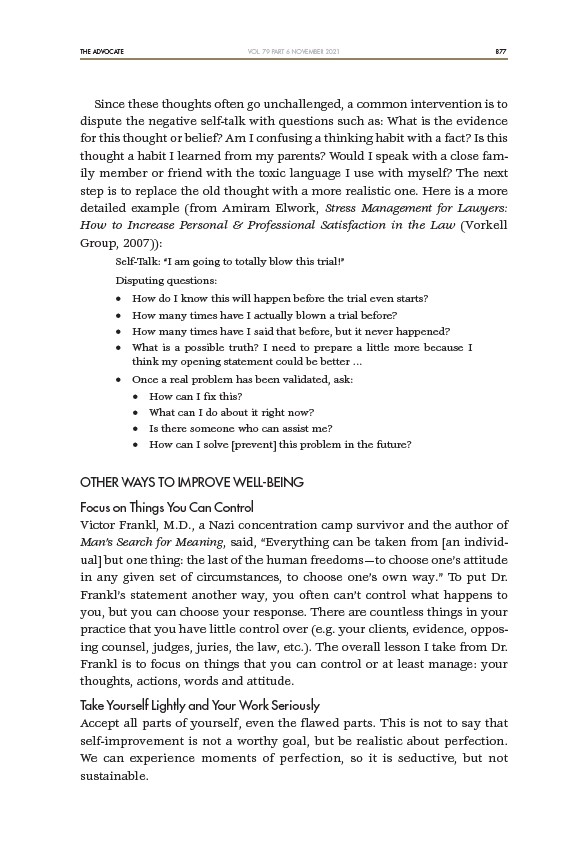
THE ADVOCATE 877
VOL. 79 PART 6 NOVEMBER 2021
Since these thoughts often go unchallenged, a common intervention is to
dispute the negative self-talk with questions such as: What is the evidence
for this thought or belief? Am I confusing a thinking habit with a fact? Is this
thought a habit I learned from my parents? Would I speak with a close family
member or friend with the toxic language I use with myself? The next
step is to replace the old thought with a more realistic one. Here is a more
detailed example (from Amiram Elwork, Stress Management for Lawyers:
How to Increase Personal & Professional Satisfaction in the Law (Vorkell
Group, 2007)):
Self-Talk: “I am going to totally blow this trial!”
Disputing questions:
• How do I know this will happen before the trial even starts?
• How many times have I actually blown a trial before?
• How many times have I said that before, but it never happened?
• What is a possible truth? I need to prepare a little more because I
think my opening statement could be better …
• Once a real problem has been validated, ask:
• How can I fix this?
• What can I do about it right now?
• Is there someone who can assist me?
• How can I solve prevent this problem in the future?
OTHER WAYS TO IMPROVE WELL-BEING
Focus on Things You Can Control
Victor Frankl, M.D., a Nazi concentration camp survivor and the author of
Man’s Search for Meaning, said, “Everything can be taken from an individual
but one thing: the last of the human freedoms—to choose one’s attitude
in any given set of circumstances, to choose one’s own way.” To put Dr.
Frankl’s statement another way, you often can’t control what happens to
you, but you can choose your response. There are countless things in your
practice that you have little control over (e.g. your clients, evidence, opposing
counsel, judges, juries, the law, etc.). The overall lesson I take from Dr.
Frankl is to focus on things that you can control or at least manage: your
thoughts, actions, words and attitude.
Take Yourself Lightly and Your Work Seriously
Accept all parts of yourself, even the flawed parts. This is not to say that
self-improvement is not a worthy goal, but be realistic about perfection.
We can experience moments of perfection, so it is seductive, but not
sustainable.